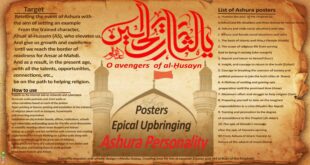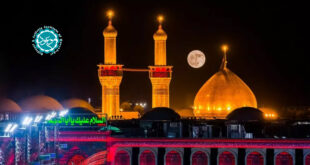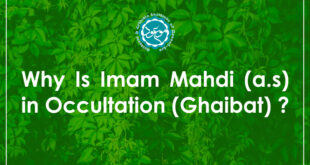Imam Husayn (a.s) is reported as saying:
I am sure that Allah’s Messenger believed that the best deed after prayer was to make a believer happy provided there is no sin involved.
The Most Generous Man!
A Bedouin arrived in Medina asking for the most generous man living there. They guided him to Imam Husayn. The Bedouin entered the mosque and found Imam Husayn praying. He stood in front of the Imam, reciting a poem with the following content, “Whoever knocks at the door of your house will not be desperate. You are the paragon of generosity. You are a haven. Your father put the unbelieving rebels to death. Were it not for your sake, our life would be a hell.”
Imam Husayn saluted the Bedouin, then said to Qanbar, “Is there any of Hijaz holdings left?” He said, “Yes, about four thousand Dinars.” The Imam said, “Bring it here, for he is more deserving of it than us.” Then, he took his cloak off his shoulders, wrapped the money in it and gave it to him, reciting a poem with the following content, “Take this holding from me and accept my apology. Know that I would like to be kind to you. If the reins of the rule were in our hands you would be showered with generosity; but the vicissitudes displace the affairs and presently we can give away only a little.”
The Arab took the holding from the Imam while his eyes were full of tears. The Imam said, “What I have given to you is a little.” The Arab answered, “The reason I am crying is that I wonder how the earth will eat this giving hand.”77
What a Sorrow!
Imam Husayn (a.s.) went to visit Usamah ibn Zayd who had fallen sick. Usamah kept on saying, “What a sorrow!” The Imam asked, “Dear brother! What is sorrow for?” He said, “I owe sixty thousand dirhams.” The Imam said, “I promise to pay it.” He said, “I am afraid that I will die before my debt is paid.” Imam Husayn said, “I will pay it before your death.” He did so.78
Helping the Needy
In the events of Karbala, they found a scar on the shoulder of Imam Husayn. When Imam Zayn al-Abidin was asked about it, he said, “This is a mark left by the heavy leather bag replete with what the widows, orphans and the poor needed, which my father carried on his shoulders.”79
Honoring A Teacher
Abd al-Rahman al-Salami taught Surah al-Fatihah to one of Imam Husayn’s sons. When the child recited before the Imam, he gave the teacher a thousand dinars as well as gifts. They objected to the Imam’s act, but he said,“What I have given to him cannot make up for what he has done.”80
Seek My Pleasure
There was an argument between Imam Husayn and his brother, Muhammad ibn al-Hanafiyyah. In a letter to Imam Husayn, Muhammad wrote, “Dear brother! Ali is my and your father. In this relation neither I am superior to you nor are you superior to me. Your mother is the daughter of the Holy Prophet. Should my mother possess all the gold of the world, she cannot be equal to your mother in terms of virtues. When you read the letter, come to me and seek my pleasure, for you are more deserving of good deeds than me. May peace and blessing of Allah be upon you.” After reading the letter, Imam Husayn went to his brother and there was no argument between them any more.81
Liberality
On the day of Ashura (the tenth Muharram), Imam Husayn was told to submit to the rule of Yazid and pledge allegiance to him. The Imam replied:
By Allah! I will not put my hand in your hand like the abased people nor will I escape from the battlefield like slaves.
Raising his voice, the Imam added:
O servants of Allah! I seek refuge to my Lord and Your Lord from every arrogant person who does not believe in the Day of Reckoning.82
Better Greeting
Anas reports: I was in the presence of Imam Husayn when his slave-girl entered the room presenting a bunch of basil as greeting. The Imam said, “You are free in the way of Allah!” I said to the Imam, “She presented an inexpensive bunch of basil to you and you set her free!” The Imam said, “Allah has taught us courtesy as such when He has said:
And when you are greeted with a greeting, greet with a better greeting than it or return it, surely Allah takes account of all things. (4:86)
Therefore, in this case, a better greeting was to set her free.
Man’s Value
An Arab came to the presence of Imam Husayn saying, “O son of Allah’s Messenger! I have undertaken to pay blood money but I cannot afford it. I said to myself that I will ask it from the most generous man and I don’t find anyone more generous than Ahl al-Bayt.” The Imam said, “O Arab brother! I will ask you three questions. Should you answer one of them, I will give you a third of what you need. If you answer the second question, I will give you two-thirds of it and finally if you answer all the three questions, I will give to you all you need.”
The Arab said, “Will you – a man of knowledge and honor – ask questions from such a person as me?” The Imam said, “Yes, I heard my grandfather saying that everyone’s value is to the extent of his knowledge.”The Arab said, “All right, ask me your questions. I will answer if I can. Even if I can’t answer your questions, I will learn them from you.” The Imam asked,“What is the best deed?” The Arab said, “Belief in Allah.” The Imam asked,“What is salvation?” The Arab said, “Trust in Allah.” The Imam asked, “What is an ornament for men?” The Arab said, “Knowledge accompanied with forbearance.”The Imam said, “What if there were no forbearance?” The Arab said, “A wealth accompanied by generosity.” The Imam said, “What if there was no generosity?”The Arab said, “Indigence accompanied by patience.” The Imam said, “What if there was no patience?” The Arab said, “A thunderbolt coming down from heaven to burn such a person who deserves it.” The Imam smiled, gave him a purse of one thousand dinars as well as his ring with a gem worth two hundred dirhams saying, “O Arab! Give the one thousand dinars to your creditors and leave the ring for living expenditures.” The Arab took them reading the holy verse,
Allah best knows where He places His message. (6:124)83
Notes:
77. Al-Manaqib: 66/4
78. Al-Manaqib: 65/4
79. Al-Manaqib: 66/4
80. Al-Manaqib: 66/4
81. Al-Manaqib: 66/4
82. Al-Manaqib: 66/4
83. Jami al-Akhbar: 137, Chapter: 96
 Mouood Mouood English Edition
Mouood Mouood English Edition




